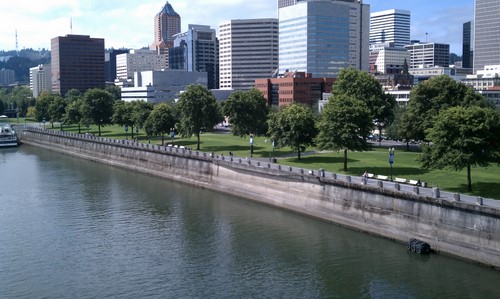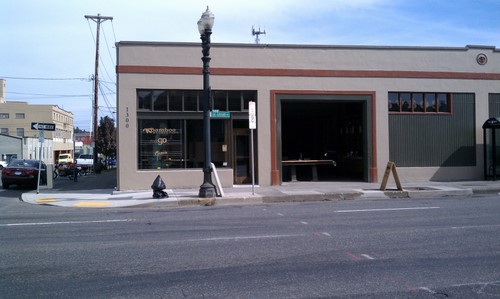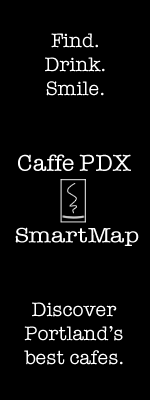Coava Coffee Roasters
 Tuesday, September 14, 2010 at 8:36PM
Tuesday, September 14, 2010 at 8:36PM I wasn’t sure where I was going yesterday when I left the house, so I pointed myself eastward and started walking. It was a beautiful day, warmer than I realized when I left the apartment. I walked down to the riverfront and turned north. It was nearing lunchtime, and when I got down to the river, lots of people were out walking and running along one of Portland’s most beautiful spaces. There were more people out running than usual—it appears that people are gearing up for next month’s Portland Marathon and getting in some extra miles during their lunch breaks.
I considered continuing north along the river and then turning back into the Pearl District, but the East Side was calling me, so I crossed over Naito Parkway and climbed up on to the Morrison Bridge. As I crossed, I realized that the bridge is a good place to look at downtown and take pictures. I took a few before crossing over the bridge and into the Central Eastside Industrial district. I like this part of town: it’s a part of Portland that works. The neighborhood isn’t as concerned as some neighborhoods about looking pretty, and the array of wholesale and distribution centers is more diverse than I thought. You don’t realize the amount of business going on in this city until you see all of the office supply stores, wall covering stores, lumber stores, industrial bakeries, etc. that are found in this area.
 A beautiful day on the waterfront
A beautiful day on the waterfront
Continuing eastward, I crossed Martin Luther King, Jr. Boulevard (MLK) and walked one more block to Grand Ave. I turned right on Grand and walked southward. As I crossed Main Street I noticed a sign to my left that said Bamboo Revolution. Very Portland, I thought. One of the city’s claims is to be the most sustainable city in the US, and a store that sells bamboo flooring and counters fits that mould (Sustainability is a theme that will show up frequently as I write more about Portland.)
A few steps later, I noticed an A-frame sign on the sidewalk that said Coava (koh-vuh) Coffee Roasters. I did a double-take because I thought I was passing a bamboo flooring shop. Apparently, I was right on both counts. Inside I saw a coffee bar, and I couldn’t resist the temptation to stop in and check it out.
 Coava/Bamboo Revolution
Coava/Bamboo Revolution
What I found inside was definitely a Portland-type place. The café had the feel of a wood shop. The floor was painted cement, and you could see where the paint had chipped away in the past, only to be repainted several times. Many of the tables were built from old woodworking machines (I sat at a converted drill press). The whole café smelled like wood to me (though the owners of the shop would probably prefer I said it smells like bamboo). The coffee bar was just to the right inside the large roll-up door. Several chemex brewers sat on the bar, waiting to brew individual pots of coffee to order. At the center and back of the store, a salesman was telling someone about the benefits of using bamboo products in a house. There were several racks of bamboo flooring and countertops that separated the café from the Bamboo Revolution’s office area.
 The bar, the roaster and the showroom
The bar, the roaster and the showroom
I had entered the café behind two other customers, so I got to listen as the barista behind the counter described the varieties of coffees for sale. It was clear that he was a coffee expert and enthusiast. I later found out that he was Matt Higgins, one of the co-owners. He and his best friend, Keith Gehrke, opened the café just two months ago, after having spent a year and a half roasting coffee for other local coffee shops.
The espresso I ordered took a while to make. As Matt explained to me, there’s a short window when pulling the shot, and if you don’t hit that window just right, it ruins the drink. He had missed the time window by a couple seconds, so he had to make another, since he didn’t want to give me an inferior product. I appreciated his desire for perfection. When I did finally get my espresso, my taste buds were very surprised when the coffee reached them. I had ordered El Limon (“the lemon”), a Honduran coffee that was supposed to have cola and cherry notes. There was no question that the coffee lived up to its name. The espresso was very tangy, and almost had a salty aftertaste. It was very different from the espresso you get at Starbucks or from a café serving Illy coffee. Those tend to have a dense, sweeter flavor without the strong acidity. Matt explained that the other coffees are multi-regional blends, while his espresso was single origin.
 My table
My table
He also told me that the highest priority for the café is to sell the best-tasting coffee possible, and it was clear that they put a lot of energy into that. In fact, Coffee Review, a guide for coffee buyers, gave all of Coava’s coffees a rating of 90 or better in a series of blind reviews.
Sustainability is also another priority for the company. In addition to using solar power to reduce the building’s energy use, the café is working to reduce the amount of paper cups that coffee drinkers use. Coava has a unique offer that if you buy a reusable ceramic travel mug (complete with washable rubber travel lid) for $15, they will give you a gift certificate for $15 worth of coffee. They believe that the quality of their coffee will keep you coming back for more, so they are effectively giving away their mugs.
 Coava to go
Coava to go
Why is Coava located in a bamboo flooring retail shop? I posed that question to Matt, and he told me that originally, they were looking at other sites but negotiations for the leases fell through. Their designer/builder happened to work for Bamboo Revolution, so Matt and Keith were able to rent out space in the Bamboo Revolution showroom for their coffee shop. The space was originally supposed to be the site of a model kitchen, but instead it is a living demonstration of Bamboo Revolution’s products. It’s a good arrangement for both companies.
The atmosphere in the café was kind of loud. On warm days, when the door is rolled up, you get a lot of noise from cars driving by. The café shakes as big container trucks rumble by on their way to the port. Hip hop and rock music poured out of the speakers in the corner while I was at the café. If you’re looking for a quiet place to read or study, Coava is probably not the best place for you to go. However, if you’re looking for a uniquely Portland coffee shop, where you can get fresh-roasted coffee from people who have the highest quality standards, Coava is a good bet.
Vitals
Address: 1300 SE Grand Ave, Portland, OR 97214 (map)
Phone: 503.741.9173
Coffee: Coava (roasted on-site Monday, Tuesday, Thursday and Friday)
Free Wi-Fi? Yes
Recommend it? Yes, especially if you are interested in learning about coffee and/or roasting theory.
Hours: Monday-Friday 7am-5pm
Saturday-Sunday 8am-5pm
Website: http://coava.myshopify.com/



Reader Comments (4)
Is bamboo really sustainable as a building material in the West? I'm assuming they get their bamboo from Asia, since labor costs in the harvest would be prohibitively high in the USA. While it is a fast-growing plant, and a great construction material, China is suffering from a shortage of natural bamboo forests (that is one reason the giant panda is endangered--that and it is one stupid animal that often has to be taught how to have sex), probably due in part to its use as a building material--that and disposable chopsticks. To combat this, the Chinese are cutting down wood forests to plant more bamboo forests to provide for the boom in building needs. There is also the shipping from Asia to the West, which not only costs a lot of money, it also burns quite a bit of fuel. Also, Chinese farmers are using chemicals to speed the growth process and to finish the bamboo, which contributes to that rot-gut the Chinese call ground water. I love bamboo as a building material, but I'd have to be convinced a bit more before I'd buy that it is sustainable here in the USA. To me, it seems like an expensive way to salve our guilt in using our own forests for material, but in reality, does little to change environmental reality. I'd love to be convinced, since I do love the look and durability of bamboo. I am glad there are retailers out there who sell it because it does give an interesting choice of goods for builders and it is beautiful.
What does Coava mean? Do you know?
Sorry, I should have checked their website first: COAVA = Turkish for green coffee pronounced ko-vuh
Found in the Travels of William Biddulph. This work was published in 1609.
"Their most common drinke is COFFA, which is a blacke kinde of drinke, made of a kind of Pulse like Pease, called COAVA; which being grownd in the Mill, and boiled in water, they drinke it as hot as they can suffer it"
Tangy & salty espresso sounds terrible.